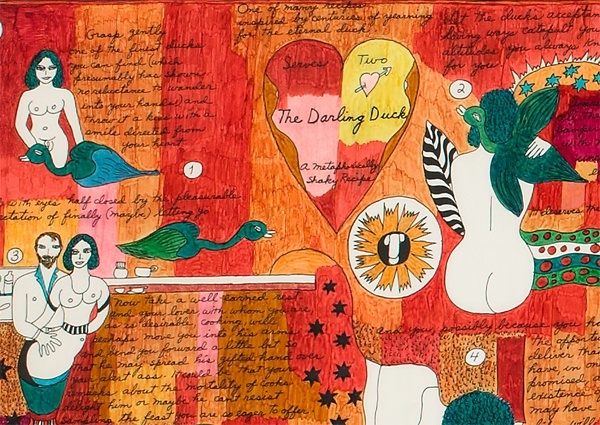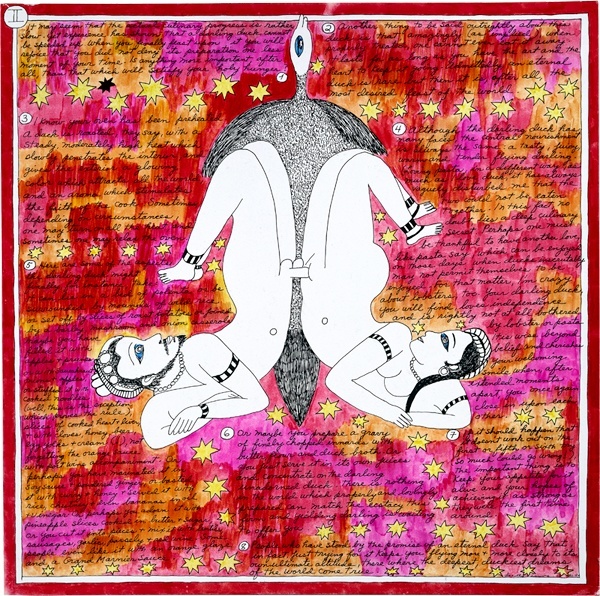Dorothy Iannone is a Berlin-based American artist whose work explores and promotes oneness, spirituality, and liberation—a state that she frequently calls “ecstatic unity.” Born in Boston in 1933, Iannone studied English literature at Brandeis, taking up painting, drawing, and sculpture of her own accord. Her work is vividly forthright and sensual, and she often depicts herself and her lovers—most famously, her seven-year affair with the Swiss artist Dieter Roth—and at the same time, recounts the events in writing, combining word and image to fully express herself in her search for emancipation. Over a long career, Iannone frequently encountered censorship, which kept her on the sidelines. But a surge of interest in her work, stemming from her inclusion in group shows at the Tate Modern in London and the Whitney Bienniale, in 2005 and 2006, respectively, resulted in her inaugural US solo exhibition at the New Museum in 2009.
The following is an exclusive excerpt from a new book of Iannone’s work, You Who Read Me With Passion Now Must Forever Be My Friends, out on December 1st from Siglio Press. Created in 1983-4, “The Darling Duck” is a triptych of felt pen and ink on Bristol board, each piece 21.7 x 21.7 inches in size. In it, Iannone describes the drawn-out pleasures of perfectly cooking a whole duck with your lover, using the act as a metaphor for reaching the eternal plane while maintaining the joy of physical love.
I
Grasp gently one of the finest ducks you can find (which presumably has shown no reluctance to wander into your hands) and throw it a kiss with a smile directed from your heart and with eyes half closed by the pleasurable expectation of finally (maybe) letting go.
Let the duck’s acceptance of your loving ways catapult you into those altitudes you always knew were best for you. Soaring higher all the time, pamper your duck with new and unexpected embraces. It deserves the best you can give it.
Now take a well‑earned rest. And your lover with whom you are, as is desirable, cooking, will perhaps move you into his arms and bend you forward a little bit so that he may spread his gifted hand over your alert ass. It could be that your remarks about the mortality of cooks delight him or maybe he can’t resist sampling the feast you are so eager to offer.
And you, possibly because you have never had the opportunity to entirely deliver that which you have, in one way or another, promised and on the existence of which you may have (almost) staked your life, will possibly drop to your knees and kiss your lover’s shoes because you hope like hell that he is the ideal dinner companion. (And if he reciprocates, why then, so much the closer.)
The great chefs permit at this point, that the cooks partake of some more wine and, according to taste, a little tobacco, too. Nothing prevents them, of course, from having already turned on. Very few people who seek the eternal without abandoning the flesh care to give up all of these spiritual aids. The great chefs never tire of telling us that, since this dish takes so long to prepare, one may tranquilly make love not only during its preparation but also before the cooking begins as well as forever after the meal.
So there you are, hanging around the kitchen in ecstasy.
It would not hurt, for possible future use (with the salad maybe) to squeeze a lemon right now and to set it aside. Should your lover squeeze the lemon with all his might and say, “You wish I would squeeze your ass this way, don’t you,” just let it go with a simple gasp. It is quite natural for the soul to be seized while preparing the darling duck.
It is not for everyone, not for the very young, for instance, but it would not hurt to drop a tear or two somewhere in the nearness of your duck because, remembering the past, you neither deny nor object that the future might someday bring another thousand tears or two.
II
It may seem that the actual culinary progress is rather slow. Yet experience has shown that a darling duck cannot be speeded up. When you finally feast upon it, you will rejoice that you did not deny its preparation one less moment of your time. Is anything more important, after all, than that which will satisfy your holy hunger.
Another thing to be said outrightly about this duck is that, amazingly (as implied), when properly treated, one cannot ever eat it away. It lasts for as long as you have the art and the heart to keep it going. Admittedly, an eternal duck is rare but then it is, after all, the most desired feast of the world.
I know your oven has been preheated. A duck is roasted, they say, with a steady moderately high heat which slowly penetrates the interior, and gives the exterior a glowing color which attracts all the world, and an aroma which stimulates the faith of the cook. Sometimes, depending on circumstances, one may turn on all the heat, and sometimes one may relax the oven.
Although the darling duck has many faces, the central nourishment is always the same: a tasty, juicy, warm and tender, flying darling. Loving pasta, in a different way, as much as I love duck, it has always vaguely disturbed me that the two could not be eaten together. In this fact, no doubt, lies a deep culinary secret. Perhaps one must be thankful to have another love, like pasta say, which can be enjoyed on those days when ducks inscrutably may not permit themselves to be enjoyed. For that matter, I’m crazy about lobsters, too. Your darling duck, you will find, loves independence and is rightly not at all bothered by lobster or pasta. It is wise beyond belief and cherishes your welcoming smile when, after extended moments apart, you once again close in upon each other.
Here are some of the aspects the darling duck might finally, for instance, take: it can lie on a bed of golden polenta or be surrounded by mounds of wild rice or set off by slices of roast potatoes or joined by a barley, mushroom and onion casserole. Maybe you have filled it with apples and prunes, or with sauerkraut, onions and apples, or stuffed it with cooked noodles (well, this is the exception which proves the rule), slices of cooked heart and liver and with cloves, honey, beer, egg yolks and cream (!), not forgetting the orange sauce with port wine accompaniment.
Or perhaps you have marinated it in soy sauce and powdered ginger, or basted it with curry and honey and served it with rice, chutney and even bananas in oil and vinegar. Or perhaps you adorn it with pineapple slices cooked in butter and sugar, or you cut it into pieces and mix it with lentils, sausages, garlic, parsley and red wine. Some people even like it with an orange glaze and a Grand Marnier sauce.
Or, maybe, you prepare a gravy of finely chopped innards with butter, flour and duck broth. Or you just serve it in its own juices and concentrate on the darling, unadorned duck. There is nothing in the world which properly and lovingly prepared can match the ecstasy this firm and yielding darling is willing to offer you.
If it should happen that it doesn’t work out on the first or fifth or sixth try (so much could go wrong!), the important thing is to keep your appetite for it alive and your hopes of achieving it as strong as they were the first time around.
People who have stood by the promise of an eternal duck say that, in fact, just trying for it keeps you flying more and more closely to its own ultimate altitude, there where the deepest, duckiest dreams of the world come true.
III
Still, the unbelievers should not go away hungry, and for them here’s a concrete Lobster with Spaghetti Recipe
Cookery, conversation, and concupiscence are waiting, sometimes even impatiently, for you.
Never cry while you cook!
2 live lobster—1 1⁄2 pounds each
1/3 cup olive oil
1 clove garlic, minced
1 small onion, chopped
1 teaspoon salt
1⁄2 teaspoon cayenne pepper
Fresh black pepper
1 cup canned tomatoes
2 tablespoons tomato paste
2 tablespoons water
2/3 cup dry white wine
2 tablespoons chopped parsley
1 teaspoon oregano
1 pound pasta cooked, drained
1. Wash lobsters. Cut spinal cord by inserting knife where tail + body meet.
Turn lobsters on their backs and split lengthwise. Cut each tail into three pieces.
Cut off claws and crack.
2. Heat oil in skillet, add lobsters, cook over high heat 3-4 minutes till red. Add garlic,
onion, seasonings + cook, stirring, 2 minutes.
3. Add tomatoes, and tomato paste blended with water and cook, turning constantly,
one minute.
I would rather be making lobster and spaghetti for you + me than a drawing about it.
4. Add wine, parsley and oregano, and cook about 10 minutes, turning frequently.
Come again to the little kitchen where Everything you like, still likes you.
5. Pour sauce over spaghetti and garnish platter with lobster.
If not now, when?
Serves 2-4
“The Darling Duck” (c) Dorothy Iannone. Courtesy of the artist and Air de Paris.
To contact Guernica or Dorothy Iannone please write here.




